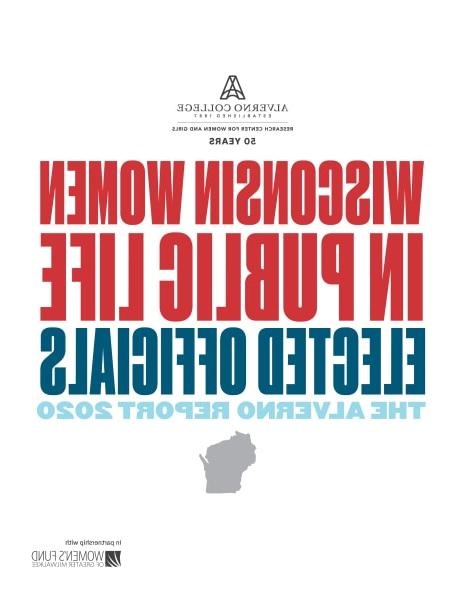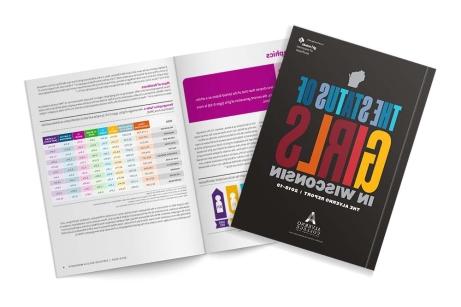Our Research
For more than 50 years, the 赌博游戏app College Research Center for Women and Girls has generated, applied and shared research to better understand – and ultimately improve – the lives of women and girls in Wisconsin and beyond. A selection of our past research publications can be found below.
Our latest report
To celebrate the 50th anniversary of the Research Center for Women and Girls and the 100th anniversary of the 19th Amendment, we are conducting an updated version of the first RCWG report: Wisconsin Women in Public Life. This survey is intended to better understand women's pathway to office in Wisconsin in order to develop strategies and tell the stories of women's success in elected office.
Click here to download the 2020-2021 Women in Public Life Research Brief.
The RCWG has further partnered with the Wisconsin Women’s Council to explore women’s representation at various levels of government. Please click the links below to review our findings:
- Wisconsin women elected to village boards
- Wisconsin women elected to city government
- Wisconsin women elected to county office
The Status of Girls in Wisconsin
The Status of Girls in Wisconsin provides information, without extensive interpretation, to serve as a catalyst for young women and girls and the agencies that serve them to voice their perspectives on the issues and challenges they face and work to develop the solutions, programming and resources needed to address these issues.
The report is still the most comprehensive consolidation of information about the issues facing girls in our state. Several universities and colleges nationwide have followed 赌博游戏app College’s lead in presenting data to improve the lives of girls.
Download the 2018-2019 Status of Girls in Wisconsin Report.
Past reports can be downloaded below:
Status of Girls in Wisconsin Report 2014
Explore our research publications
Advancing Girls in the Science Classroom
Author: Justin LaManna, PhD
This report provides an overview of the changes that happen in girls' interest and performance in science throughout middle and high school. It provides recommendations for strategies to encourage girls in the sciences. These recommendations focus on building a clearer pathway for young women to pursue science as a career.
Download Advancing Girls in the Science Classroom
Adolescent Girls' College Aspirations: Precollege Expectations and Goal Setting of Adolescent Girls and Women
Author: Sandra E. Graham, PhD
This paper looks at key issues about the aspirations for college held by adolescent girls. It raises issues about potential and perceived barriers to girls' aspirations, especially as girls seek to enter nontraditional fields such as STEM.
Download Adolescent Girls' Aspirations
Bullying: A Prevention Toolkit
Authors: Katie Krueger, BA; Jennifer Saucerman, BA and Kris Vasquez, PhD
The Research Center's Bullying: A Prevention Toolkit answers common questions about bullying; outlines action-oriented tips for parents, educators, and community members; and provides resources for learning more about the topic. Our bullying prevention research has been shared with educators, community organizations, and representatives from the business community.
Download Bullying: A Prevention Toolkit
Bullying Prevention: Best Practices Documents
Author: Kris Vasquez, PhD
Best Practices for Parents: Bullying Prevention highlights key information for parents to address bullying behavior.
Download Best Practices for Parents: Bullying Prevention
Best Practices for Teachers: Bullying Prevention
Highlights key information for teachers to address bullying behavior.
Download Best Practices for Teachers: Bullying Prevention
Best Practices for Community Organizations
Highlights key information for community organizations to address bullying behavior.
Download Best Practices for Community Organizations: Bullying Prevention
Teen Dating Violence: A Resource and Prevention Toolkit
Authors: Kristin Payne, PhD; Terri Ward, BA; Amy (Miller) Kerznar and Kris Vasquez, PhD
Our Teen Dating Violence: A Resource and Prevention Toolkit is modeled after the very successful Bullying: A Prevention Toolkit, which the Research Center published in November 2011. Following this model, the toolkit contains sections on frequently asked questions, current research findings, action items, and resources for parents, teachers, community members, and teens. Other topics include an examination of reporting issues related to teen dating violence, myths that may contribute to the acceptance of violence in dating relationships, and the impact of gender and culture on teen dating violence.
Download Teen Dating Violence: A Resource and Prevention Toolkit
Teen Dating Violence Prevention: Best Practices Documents
Authors: Kristin Payne, PhD; Terri Ward, BA; Amy (Miller) Kerznar and Kris Vasquez, PhD
Best Practices for Communities: Teen Dating Violence Prevention and Intervention highlights key information for the community to identify and address teen dating violence.
Download Best Practices for Communities
Best Practices for Teens: Teen Dating Violence Prevention and Intervention
Highlights key information for teens to identify and address teen dating violence.
Download Best Practices for Teens
Best Practices for Mental Health Care Professionals: Teen Dating Violence Prevention and Intervention
Highlights key information for mental healthcare professionals to identify and address teen dating violence.
Download Best Practices for Mental Health Care Professionals
Best Practices for Parents: Teen Dating Violence Prevention and Intervention
Highlights key information for parents to identify and address teen dating violence.
Download Best Practices for Parents
Best Practices for Teachers: Teen Dating Violence Prevention and Intervention
Highlights key information for teachers to identify and address teen dating violence.
Wisconsin Women in Public Life
To celebrate the 50th anniversary of the Research Center for Women and Girls and the 100th anniversary of the 19th Amendment, we are conducting an updated version of the first RCWG report. This survey is intended to better understand women's pathway to office in Wisconsin in order to develop strategies and tell the stories of women's success in elected office.
Download the 2020-21 Women in Public Life Research Brief
Moving Wisconsin Forward 2015: An Analysis of Wisconsin Women in Elected Office
This report, the third in a series, covers nearly 14,000 elected offices across Wisconsin state and local governments, including the state legislature and courts, as well as county, city, village, town and school boards.
Download Moving Wisconsin Forward 2015: An Download Analysis of Wisconsin Women in Elected Office
College Age Women and Relational Aggression: Prevalence and Impact
Authors: Katie S. Krueger, BA; Meghana Rao, MA; Jeanna Salzer, BA and Jennifer C. Saucerman, BA
Relational aggression is a type of aggression in which harm is caused through damage to one's relationships or social status. The Research Center presents data from a study of college women on their experiences and perceptions of relational aggression, including the form that aggressive behaviors take in a college sample.
Download College Age Women and Relational Aggression: Prevalence and Impact
Enhancing College Students' Mental Health: Contributions from the Perspective of Community Psychology
Author: Kim Skerven, PhD, MSW
This report seeks to understand the current status of mental health in U.S. college and university students, and to use the lens of community psychology as a way of exploring viable interventions with the potential of enhancing students' psychological well-being and, in turn, their overall success in college.
Generational Diversity: Characteristics and Values of Millennials in the U.S. and Wisconsin
Authors: Amanda Page, BA and Kris Vasquez, PhD
The generation known nationally as Millennials, born between 1982 and 2000, is the largest generation in American history. As with all generations, Millennials have been shaped by the events and social forces they experienced as they came of age. They share some attitudes and values with people of different ages; they also have some distinguishing features that mark them, as a group, as different from generations before. The purpose of this report is to look at Wisconsin data and national data about Millennials to provide insight into the general characteristics of this generation as it begins to become politically and economically active in our society.
Download Generational Diversity Summary of Findings. To receive the full version of Generational Diveristy: Characteristics and Values of Millenials in the U.S. and Wisconsin, please email the Research Center at Research.Center@meteonemonti.com.
Psychological Barriers to STEM Participation for Women Over the Course of Development
Authors: Jennifer Saucerman, BA, and Kris Vasquez, PhD
Women continue to be underrepresented in the fields of science, technology, engineering, and mathematics (STEM), which has implications not only for individual women and their families but also for the productivity of society. This literature review examines psychological factors over the course of development that contribute to the ongoing underrepresentation of women in these fields. It discusses how parents and educators inadvertently communicate dissuading messages to girls about their relative math and science abilities and interests, how stereotypes become internalized by both girls and boys and negatively affect performance, how beliefs about intelligence and the nature of STEM careers discourage women and girls, and how the features of STEM careers can make it difficult for successful women to persist in the field.
Download Psychological Barriers to STEM Participation for Women Over the Course of Development
The Power of the Critical Thought Process: A Critical Thinking Model to Achieve Successful Outcomes in Quantitative Learning
Author: Linda Olszewski, MBA
赌博游戏app professor Linda Olszewski noticed a recurring behavior of female students trying to solve a problem without having fully understood what they learned first. In response, Professor Olszweski has created a new critical thinking model that incorporates three significant stages that will address identified needs.
Please contact the Research Center at Research.Center@meteonemonti.com for more information about this publication.
Advancing Girls in the Science Classroom
Author: Justin LaManna, PhD
This report provides an overview of the changes that happen in girls' interest and performance in science throughout middle and high school. It provides recommendations for strategies to encourage girls in the sciences. These recommendations focus on building a clearer pathway for young women to pursue science as a career.
Download Advancing Girls in the Science Classroom
Adolescent Girls' College Aspirations: Precollege Expectations and Goal Setting of Adolescent Girls and Women
Author: Sandra E. Graham, PhD
This paper looks at key issues about the aspirations for college held by adolescent girls. It raises issues about potential and perceived barriers to girls' aspirations, especially as girls seek to enter nontraditional fields such as STEM.
Best Practices for Teachers: Bullying Prevention
Highlights key information for teachers to address bullying behavior.
Download Best Practices for Teachers: Bullying Prevention
Best Practices for Teachers: Teen Dating Violence Prevention and Intervention
Highlights key information for teachers to identify and address teen dating violence.
Download Best Practices for Teachers, Faculty and Staff
Best Practices for Mental Health Care Professionals: Teen Dating Violence Prevention and Intervention
Highlights key information for mental healthcare professionals to identify and address teen dating violence.
Download Best Practices for Mental Health Care Professionals
Bullying: A Prevention Toolkit
Authors: Katie Krueger, BA; Jennifer Saucerman, BA and Kris Vasquez, PhD
The Research Center's Bullying: A Prevention Toolkit answers common questions about bullying; outlines action-oriented tips for parents, educators, and community members; and provides resources for learning more about the topic. Our bullying prevention research has been shared with educators, community organizations, and representatives from the business community.
Download Bullying: A Prevention Toolkit
Bullying Prevention: Best Practices Documents
Author: Kris Vasquez, PhD
Best Practices for Parents: Bullying Prevention highlights key information for parents to address bullying behavior.
Download Best Practices for Parents: Bullying Prevention
Teen Dating Violence: A Resource and Prevention Toolkit
Authors: Kristin Payne, PhD; Terri Ward, BA; Amy (Miller) Kerznar and Kris Vasquez, PhD
Our Teen Dating Violence: A Resource and Prevention Toolkit is modeled after the very successful Bullying: A Prevention Toolkit, which the Research Center published in November 2011. Following this model, the toolkit contains sections on frequently asked questions, current research findings, action items, and resources for parents, teachers, community members, and teens. Other topics include an examination of reporting issues related to teen dating violence, myths that may contribute to the acceptance of violence in dating relationships, and the impact of gender and culture on teen dating violence.
Download Teen Dating Violence: A Resource and Prevention Toolkit
Best Practices for Parents: Teen Dating Violence Prevention and Intervention
Highlights key information for parents to identify and address teen dating violence.



